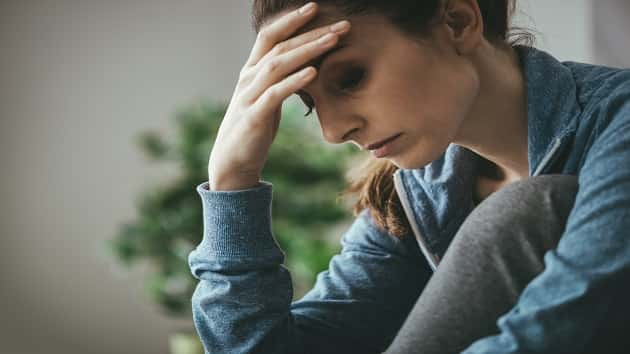
iStock/demaerre
iStock/demaerre(NEW YORK) — With countless American families cooped up together amid stay-at-home orders for the coronavirus pandemic, some law enforcement officials said they fear an unintended consequence of long-term, close-quarters living: a potential rise in domestic violence incidents.
So far there has been only a slight uptick in domestic violence calls to police, according to Steve Casstevens, president of the International Association of Chiefs of Police, but he said he’s preparing for things to get worse.
“I fully believe that the longer these stay-at-home orders [are] in place, the more of these calls we’re going to get,” said Casstevens, who is also the current chief of police in Buffalo Grove, Illinois.
Casstevens said he’d heard from other law enforcement leaders who shared his concern.
“This is the beginning period of this epidemic where people have been sheltering in place. As this gets longer and as this grows longer. I think we could anticipate an increase in domestic violence cases, both reported and not reported,” Chuck Wexler, executive director of the Police Executive Research Forum, told ABC News.
Brad Garret, a former FBI agent, described a perfect storm of domestic violence hazards.
“The shelter in place forces couples to remain home and the abuser will then have more power to control and abuse the victim, stating they cannot leave for fear of catching the virus,” said Garrett, now an ABC News contributor. “It also may make it more difficult for the abused to report domestic violence, since they are constantly with the abusers. If they can escape, the shelters then have issues because they are typically set up in dormitory settings, obviously a problem with spreading the virus.
“With typically 10 million domestic violence reports a year, the longevity of the virus will certainly drive up domestic violence reporting,” he said.
Los Angeles County Sheriff Alex Villanueva said a recent rush on gun-buying in his city only added to the danger of domestic violence, suicide and accidental shootings. He said he worries that the potential rise in domestic violence incidents, combined with new gun owners unfamiliar with their weapons, could make for a deadly combination.
Overall most local law enforcement departments are reporting dramatically lower calls for service as people shelter at home, but there are hints domestic violence could be an outlier in the weeks or months to come.
North Miami Police Chief Larry Juriga told ABC News that being so close together and the uncertain circumstances of the time could ratchet up the pressure.
“It happens oftentimes during hurricanes, you’re on top of somebody for that long. And also, it’s a combination of the stress of the unknown distress of the financial worry, the stress of the health concerns. It certainly builds up the tension not just within homes, but within businesses,” he said.
That, of course, is no excuse, Juriga said.
In Fairfax County, Virginia, Police Chief Ed Roessler told ABC News that they’ve seen an incremental uptick in domestic violence calls in the county. “It’s not an alarming uptick. What we’re seeing is two or three more than a day before,” Roessler said.
But after the calls, another problem presents itself, Roessler said: What’s the safe way to respond to those calls, both for the people involved and for the police officers?
“We are trying our best to triage those calls, obviously, by separating people physically outside of the dwelling and if they both have cell phones, for instance, and take those calls, from a point of safety, to get interviews, collect evidence, and if we have to make an arrest, we try to get voluntary compliance for the person to go turn themselves in as we get the warrant separately,” he said.
Providence, Rhode Island, Public Safety Commissioner Steven Paré added that there will be a “challenge” as to whether to hold or release potentially violent offenders, since the situation can escalate later. Paré said he expects domestic violence calls to rise in his community.
Police departments in Los Angeles, Anaheim, San Diego, and San Francisco said they have not yet seen a rise in domestic violence calls.
The National Domestic Violence Hotline also told ABC News that they haven’t seen a significant increase in the volume of calls to them.
But the calls the hotline is receiving are increasingly COVID-19-related. Anecdotally, the virus is repeatedly brought up as adding to the anxieties of people who are stuck in their homes and either getting abused or worried about reporting it, a hotline spokesperson told ABC News.
One woman in New York reported being physically thrown out of the house by her partner because he thought she had COVID-19. Another said she didn’t want to go to the hospital after being strangulated by her partner because she was worried she’d contract COVID-19, the spokesperson said.
In New York City, which has become the epicenter of COVID-19 spread in the U.S., the New York Police Department has seen record numbers of police calling out sick, but the department says it is still focusing on domestic violence cases.
“Domestic violence is an extremely high priority for all members of the New York City Police Department, from the police officer level to the domestic violence offices that we still have on hand that can aid this issue,” Dermot Shea, the NYPD commissioner said at a press briefing over the weekend.
Chief Murphy Paul of Baton Rouge, Louisiana told ABC News that they have seen a slight increase in domestic violence calls. He says they are working with community leaders to publicize local, state and national hotlines.
The chief said his officers are generally not making misdemeanor arrests at this time, but they certainly would for domestic violence, which is a felony.
He urged members of the community to be patient with operators, “work with our law enforcement” and come together in these “unprecedented times.”
Copyright © 2020, ABC Audio. All rights reserved.